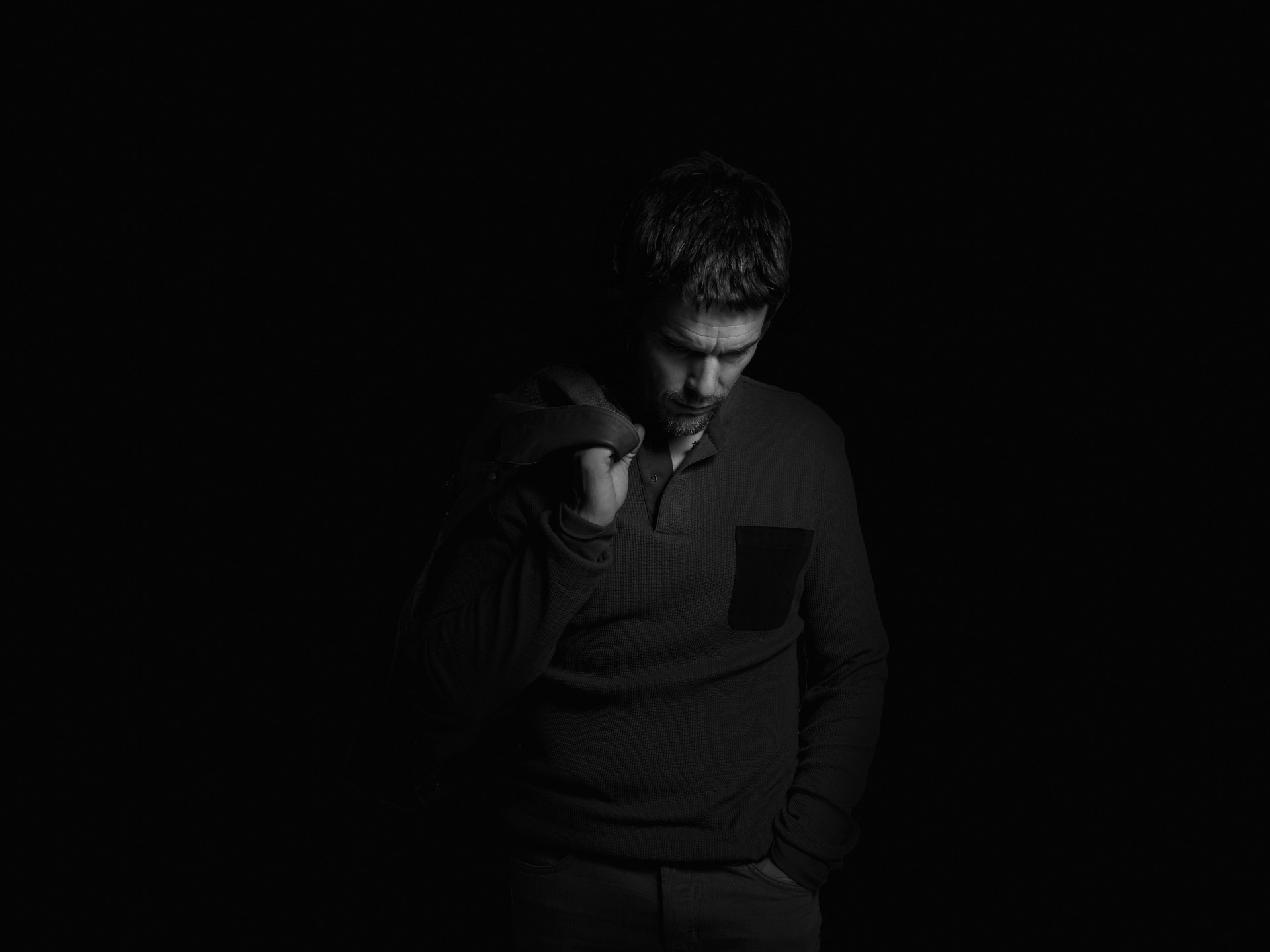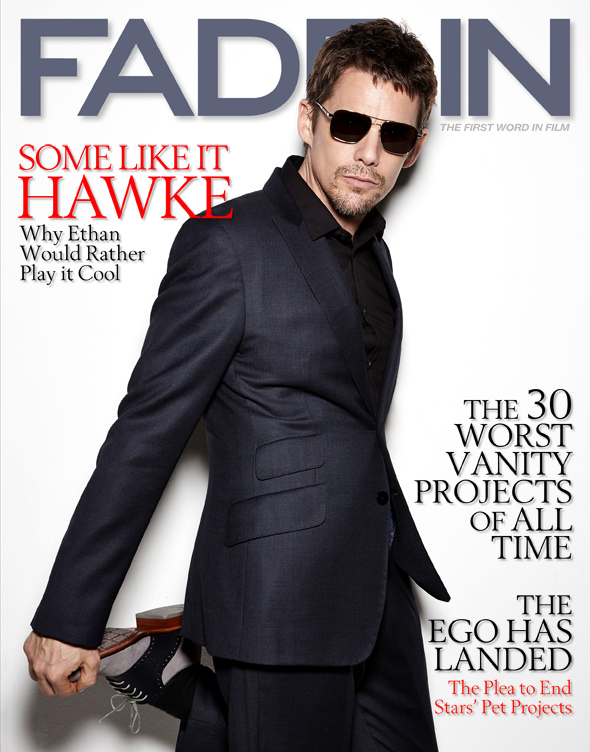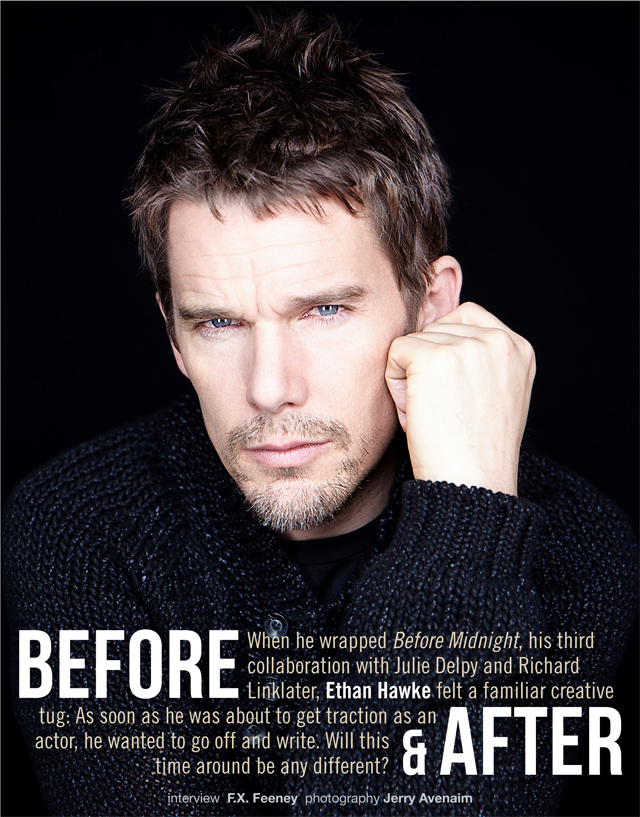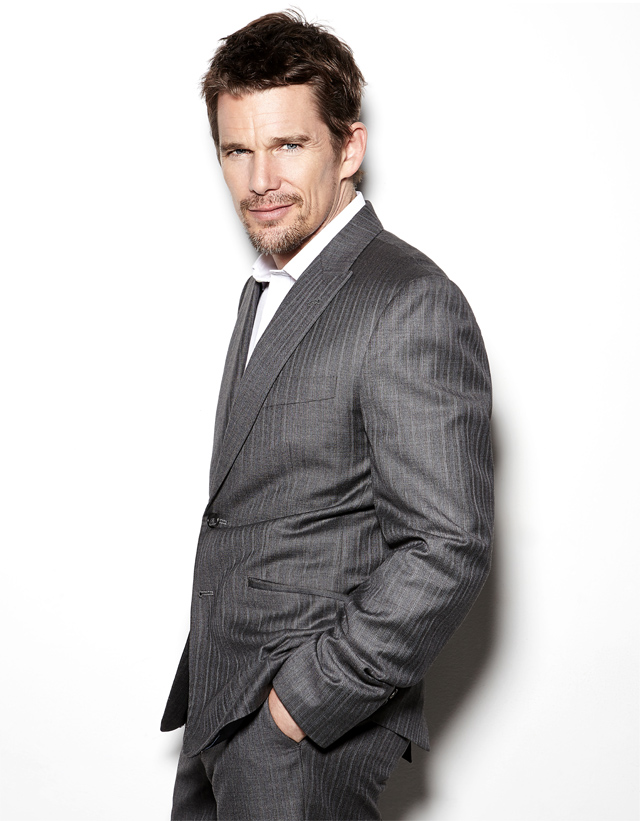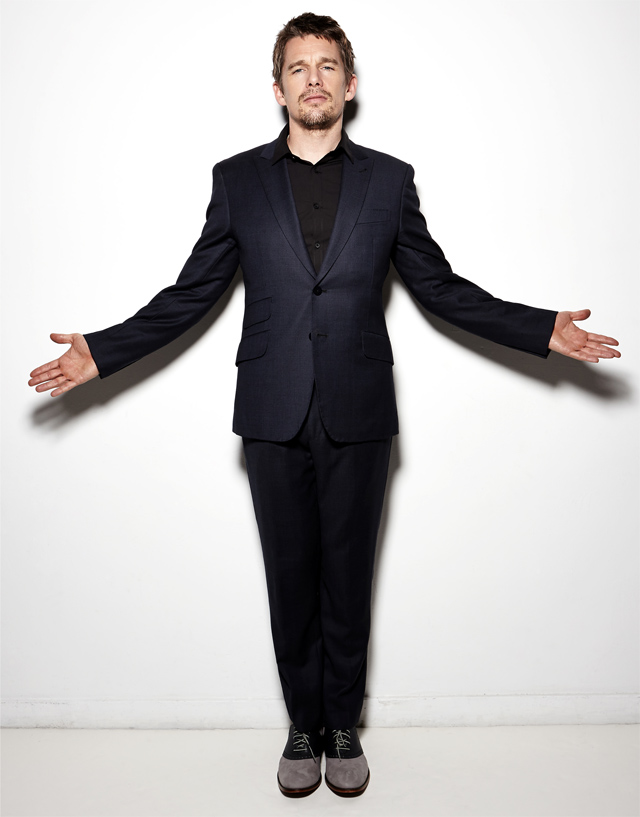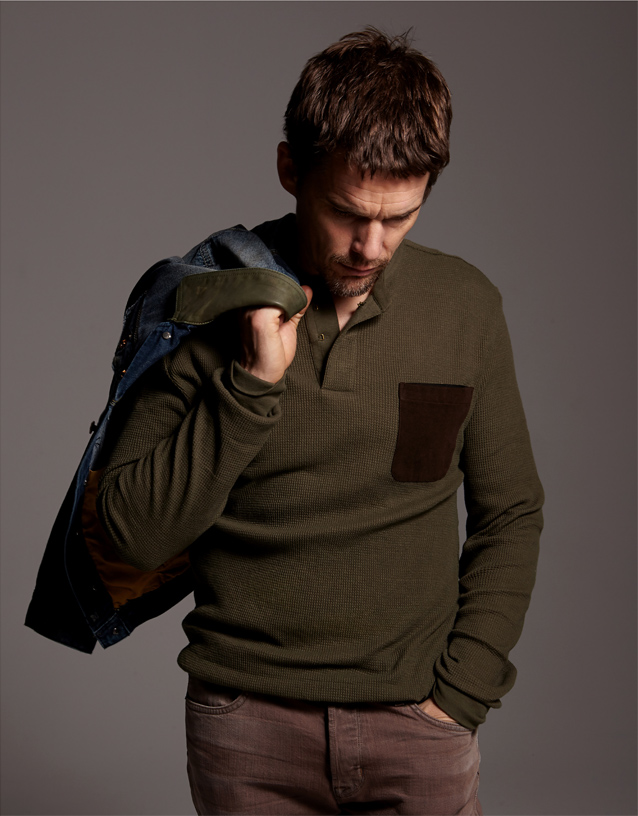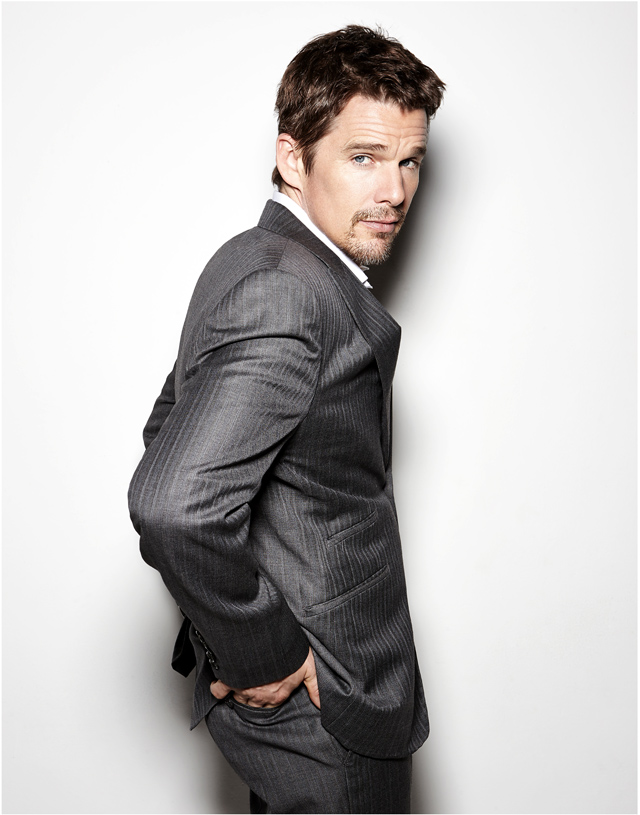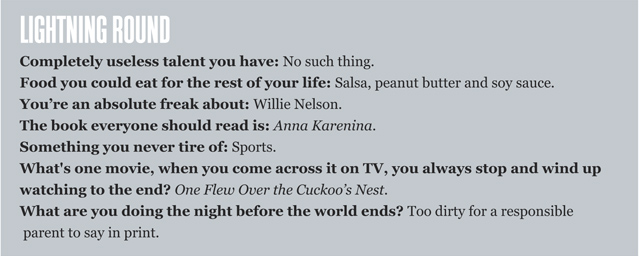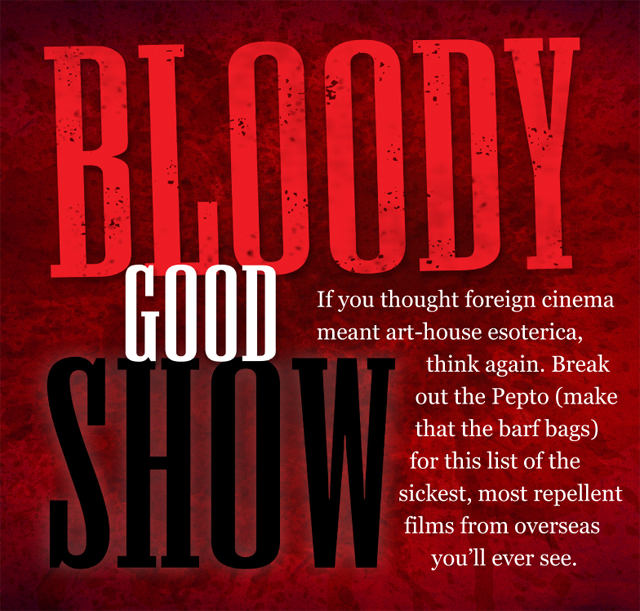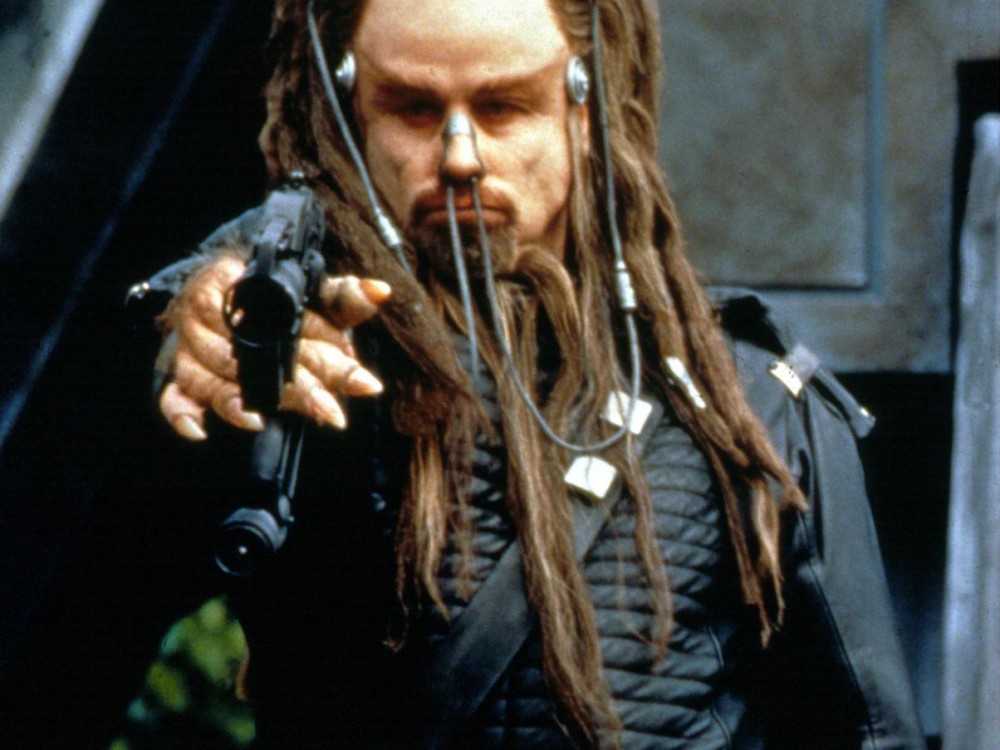Growing up in public is nothing you’d wish on anybody, yet Ethan Hawke has brought off that often lethal misadventure with rare grace — perhaps because he’s always operated at a contrary angle to whatever corner of fame he’s been placed in. His debut film, Explorers (1986), looked at first glance to be another ecstatic encounter with extraterrestrials in the tradition of E.T., but director Joe Dante — as much a mad scientist as an entertainer — subverted expectations with hilarious zest, changing the tone to farce mid-way, prompting popular audiences to shy away in droves but guaranteeing its destiny as a cult classic.
The filmmaker’s willful defiance of convention left a prophetic mark on his young star, who briefly withdrew to private life with ambitions of becoming a writer. (As if to confirm the wisdom of that choice, his Explorers costar River Phoenix tragically doubled-down on the limelight and died young.) Hawke’s desire to write makes extra sense when you realize he is a distant cousin of Tennessee Williams.
Movies nevertheless kept calling, and he went on to make Dead Poets Society (1989), Reality Bites (1994), Training Day (2001), and four dozen other films across three decades, among them Gattaca (1997), Hamlet (2000), Tape (2001) and Before the Devil Knows You’re Dead (2007). But Hawke has persistently veered from the movie star path by working in the theater — Tom Stoppard’s The Coast of Utopia — publishing two novels, The Hottest State and Ash Wednesday, establishing himself as a director (onstage with Sam Shepard’s A Lie of the Mind, on film with Nicole Burdette’s script Chelsea Walls (2002) or adapting his own The Hottest State (2006).
With the latter, he entered the exclusive club of writers who have adapted and directed their own novels — one headed by Elia Kazan and Dalton Trumbo. The Hottest State abides as an intimate, deeply moving expression of his inner life. Like his protagonist, he was born in Austin, Texas, and reared, after his parents divorced, by his mother near Princeton, New Jersey. In the film, Hawke creates through actor Mark Webber an indelible image of a wounded, whip-smart young soul divided against himself. At the same time, in a supporting role as the hero’s father — in effect as his own father — Hawke brings matters to a raw but mature emotional catharsis. Though the film’s excellence was ignored on its first release, The Hottest State’s day will come.
Hawke comes at the public from so many angles that he never needs a “comeback.” Instead, he is constantly being rediscovered. Case in point: Before Midnight (2013), the third, and deepest, installment in his eighteen-year collaboration with costar-cowriter Julie Delpy and director Richard Linklater. Where Before Sunrise (1995) and Before Sunset (2004) charted the progress of a life-transforming love affair, Midnight tackles the less romantic but more love-affirming challenge of making a day-to-day life with somebody. Each of the films is a fluent, dynamic record of who and where the performers and their director were at those stages in their lives. Not quite “autobiography” but similarly personal, perhaps more immediate. Call them automythography.
“We’re living in this age of Big Hollywood budgets. The studios are only making ten movies a year. At the same time, there’s this huge glut of movies made on flip-cams, aspiring indies, that can’t get released because we’re in this weird new environment. Genre movies have become the only way to get a movie released that can have a kind of independent and even subversive spirit to it.”
“My problem is, as soon as I get successful as an actor I feel like, I have time to write. ‘Okay, I can breathe again!’ All I’ve wanted to do since this movie’s been over is write. And all that will do is put me in the hole again! [Laughs].”
Delpy likewise entered the movies in her early teens — she made Detective with Jean-Luc Godard while Hawke was on Explorers; she shot White with Krzysztof Kieslowski roughly parallel to Hawke’s Dead Poets with Peter Weir. Such kindred frames of reference surely feed their fiery onscreen chemistry. Linklater’s powers of observation and his procreative empathy with all actors complete the power of this triumvirate.
Has there ever been a set of films so complete or believable in their record of life’s stages, between two characters? In European films, yes — Bergman’s Scenes from a Marriage comes immediately to mind, as do Truffaut’s “Antoine Doinel” films. Woody Allen’s pictures trace an individual evolution in many guises — but in America, acclaimed cable television dramas like The Sopranos and Mad Men may come closest to the rawness achieved by Hawke, Delpy and Linklater in these three movies made at nine-year intervals.
As such, they provided us with a perfect place to begin as we caught up with Hawke. He’s a welcoming spirit in person. Fresh from a whirlwind of chatty, cross-country TV promotion, not just for Before Midnight, but The Purge — a dystopian law-and-order fantasy from director James DeMonaco — he walked in eager for a more substantial conversation about filmmaking and making one’s own way as an artist.
You’ve been at this a long time. With Dead Poets Society, opportunities were coming your way. You were studying to be a writer at NYU. But you stepped away from that dream to seize the day of your momentum as an actor. And yet, very interestingly, you’ve navigated in the opposite direction since. For example, rather than capitalize on Before Sunrise in 1994, you took a couple of years off to write your novel The Hottest State. I made a left turn. Yes. Then, after Training Day — I went back and wrote [my second novel] Ash Wednesday.
Your career could have gone a very different way. What was the temptation to take on projects, based on the money? There certainly must have been many squeeze plays from your representation, from studios. How did you deal with that? It used to be easier. There’s no… How do I put this? I don’t want to come across like I’m setting myself up as this “good” person, or have any judgments about what other people want, but it’s just natural. I have never been interested in buying things. I haven’t been interested in that. It’s not a difficult decision for me to turn down money, because I don’t covet a Porsche. I know really good people who do. Or maybe they covet the power that money gives them.
My brain just didn’t gravitate there. When I was younger, that was easier, because I didn’t have any bills. It was really easy to be like, “Oh, I don’t care.”
Part of what you notice is true: My whole relationship to acting, and writing. It has been a strange one. When I was a young person, I really wanted to be Jack London. But my experiences as a child actor on Explorers had been hurtful because the public rejected that movie. Because of that, when they were doing open casting for Dead Poets Society, some people called me up: “Hey, what happened to that kid?”
There I was, not enjoying college, and I got this audition. I thought, “I’ll do this now.” My belief was that, just like Explorers, it would be a giant failure. But they would pay me thirty grand, and I could join the Merchant Marines and be Jack London. That was my eighteen-year-old fantasy, right? But instead, I was coincidentally, oddly, mysteriously in the way the universe works, offered White Fang, the Jack London book. I thought, “All right. This is meant to be.” So I went to Alaska for six months. Still, I was thinking, I don’t want to be the guy in a dog movie, you know? That wasn’t my goal in life. I felt like I was Roddy McDowall and Liz Taylor or something. [Laughs] That was the best I could hope to be! But that was when my ambitions began to combine. Dead Poets Society came out and was wildly successful. The whole thing blew up. Acting roles were coming my way, and the doors of opportunity were opening.
Who knew if I’d be a decent writer? Then Before Sunrise happened, and Rick [Before Midnight director Richard Linklater] really encouraged Julie and me to write. He had this thing where it was not going to be “his” movie. It was going to be our movie. And directors don’t say that. They ask you to be a part of their vision. But here was Rick saying, “I want this to be part of our vision.” The only way he could make a movie about a spiritual connection between two people — spiritual’s a goofy word — say a like-minded soul connection. No! Those words fail. There’s a line in the movie, “If there’s a God that exists, it exists in the space between us.” That’s what that movie wants to be about. So Rick says, “I need for it to be real. I need you guys. It can’t be me” — he was ten years older than us — “having some nostalgic thing about, ‘Oh, this is how twenty-year-olds connect.’” So he really encouraged us to write. Not just to “improvise,” but to write. He would say, “Why don’t you try writing that scene?” I would come in with something, and Julie would go, “If some boy said that to me, I would slap his face!” Oh, well, jeez, then we would rewrite it! Then she would come in with some material, and I’d say, “Oh, that is just corny as hell.”
But we became writers. Julie left that experience and wrote her first movie. I left that experience and wrote The Hottest State. It is no coincidence. We weren’t credited on that movie, but we knew what we had done, and what Rick had asked. We would read reviews that would go, “The wonderful scene when…” and one or the other of us would say, “I wrote that scene.” It was a wild feeling.
We were both really grateful to Rick. And then I got back and really started getting interested in writing and theater, but the movies still called me. I think I got worried. It was the first time — [he stops himself].
I was at this event the other day, at the Gotham Awards. Matt Damon was winning a Lifetime Achievement Award. We’re about the same age. First of all, I thought it was ridiculous that he was winning it now. He should be getting The First Half of a Lifetime Achievement Award. But whatever they need to do! [Laughs] The thing is, I remember that he got up and talked about the first time he was at the Gotham Awards, when Good Will Hunting came out, about how long ago that seemed, and how much had changed and how important that had been to him. And I thought, The first time he was at the Gotham Awards was the first time I was washed up.
That was the moment he had burst on the scene with his great performance. But that was right at the moment when I was — passé. For the first time. Before Sunrise had come out, but I didn’t do anything with it. I went back to my theater company; I wrote The Hottest State. All of a sudden, the offers weren’t there anymore. I would want to go in on big movies, but I had that weird problem: I was famous, but not popular. If they wanted an unknown, they would go out and get an unknown. If they wanted somebody famous, then they wanted somebody who was hot. They wanted Matt Damon. They wanted Ben Affleck. It was also the ten-year mark. This was ’98? It had been about ten years since Dead Poets Society.
“Here I am, quietly going broke, working for free in Paris, having a ball, but thinking, ‘I’m about to turn forty. What’s going to happen to me? All my interests are out of fashion. I have no desire to go to L.A. and be a studio person. I went online. It was one of those dark impulses, and it was more than one night, I’m sorry to say…”
I started feeling washed up, and I put a lot of energy back into my acting. I did Tape and I did Hamlet, and all that ended up translating into Training Day. But the funny thing is, I have a slight allergy to success. [Laughs] Too much success makes me really uncomfortable. I was here for the Oscars, and you’re right, I was offered big action movies, because they kind of wanted me to be an action star after Training Day.
You make yourself disappear into that Interpol agent you play in Lord of War. It’s such a mature performance. Then one discovers you in Linklater’s Tape, and realizes: “Oh, this is where that maturity comes from.” Exactly. But after Training Day I threw myself back into writing and wrote Ash Wednesday. I’ve been just bouncing back and forth like that for a while now.
“Allergy to success” is how somebody outside might say it, but inside it seems to be a more positive trade-off. Yet clearly your own attitude is evolving. Should this provide the positive resurgence — last night at the DGA, people were practically talking back to the screen like a Time Square audience, they were so into Before Midnight; The Purge is #1 at the box office — how do you now steer within this next wave of momentum? Thank you. You’re right. That “allergy to success” thing is something people have said about me. To be honest, I don’t buy it at all, not for a second. I’ve never seen it that way.
Training Day was a great script. Most action movies are not. It’s very fucking hard to have the right kind of success. I have struggled — and Rick will tell you this, too — because when things go well, crap flies at you. And it is so hard to navigate it! When things aren’t going well, it’s a lot easier to see. There’s not a lot of bullshit around you.
I’ve always wanted the right kind of success. Rick and I had this thing that we would say when Julie was giving us a little static. She asked, “Do you really think the world cares about Jesse and Celine?” And our answer was, “The bar for this movie is not Before Sunset. The bar for this movie is Scenes From a Marriage.” We’ve got to set the bar higher!
And that’s the thing: I’ve coveted, my whole life, the right kind of success. I’ve liked it to come in independent film. There’s a thing that happens with mainstream movies. Certain people can do it. When you’re with them in a film, you can do it. With a good script, and Denzel’s power and brains, the set becomes very creative.
Is there a project you turned down that, in hindsight, you wish you would’ve taken? I auditioned for the young man’s role in Clint Eastwood’s Unforgiven. I still wish I got that part.
You’ve done numerous speculative fiction films like Gattaca, Daybreakers, the upcoming Predestination and now The Purge. What is it about the genre that appeals to you so much? I love movies, and my hope is by the end to have created a little something good for everybody. You like cop pictures? I got one! You like horror? Got it! Art films? Check. Shakespeare? Check. Western? Comedy? Coming right up!
The whole paradigm in Hollywood has shifted. You’ve had a foot in both worlds — studio and indie. From Explorers to now is like jumping from the age of the dinosaurs to modern times in a cross-dissolve. There are so many different kinds of opportunities now. I know. What you have to be is open-minded. The thing I really respected about getting to work with Sidney Lumet is, here was this eighty-three-year-old guy whose brain was open. Philip Seymour Hoffman and I came to him and asked him not to shoot the movie on DV. “Come on, let’s do it on film, like you did Dog Day Afternoon,” you know?
He said, “Look, I did Dog Day Afternoon in the most economical way possible. That’s the way I’m going to do this one. You want it to look vintage and cool? Trust me: In twenty-five years, it’ll look vintage and cool.”
So, yeah, I’m wide open. People are doing great work on TV? Great! But that’s a false god, in a way. The people who do Breaking Bad and Mad Men, and the really exceptional TV? They’re really special. They’re really the exception. If we had to do a Before Sunrise once a year, the quality would go down with a crash. It just would. We couldn’t do it. If Jesse and Celine had to do twenty-two episodes a year, our series would be boring as hell. Instead, it’s because we’ve been allowed to grow, and nurture, and breathe with the characters like we do that the quality goes up. That’s the fun of writing with Rick and Julie. We throw a lot of material out there, but we condense it. Each movie is a greatest-hits album of nine years of work.
That’s where the nine years work rhythmically. It’s almost like nine months of pregnancy. Not that this is your conscious plan. But it is a little bit like that. It’s time to shed the skin, time to live some more, then time to create a new skin. Boom, boom, boom: Each phase is like a trimester. So I’m worried about TV that way.
I don’t know what the future of independent film is. Remember, Before Sunrise was a fucking studio film! Columbia Pictures made it. I doubt any studio in the last five years has made a two-point-seven-million-dollar movie. They just don’t make that kind of movie. Also, neither Julie nor I was a star. I was a rising entity; Julie was unheard of in America, except by cinephiles. Nearly a decade later, Before Sunset was Warner Independent — a subsidiary of a studio, where the studios are trying to do the indie thing. Nowadays Warner Independent is totally out of business, as are most of the subsidiaries — and here we are with Before Midnight, which we got made by patchworking with individuals’ money. That’s the story of the last eighteen years, and where we’ve come.
We didn’t know how cool it was in the ’90s. In the ’90s, I was complaining that it wasn’t the ’70s. And now I’m missin’ the ’90s!
That’s why I’ve had some fun recently working in genre films. I feel like it’s Roger Corman in the ’50s. We’re living in this age of Big Hollywood budgets. Leo [DiCaprio] and Baz [Luhrmann] are spending $200 million, the studios are only making, like, ten movies a year. At the same time, there’s this huge glut of movies made on flip-cams, aspiring indie movies, that can’t get released because we’re in this weird new environment. Genre movies have become the only way to get a movie released that can have a kind of independent and even subversive spirit to it. “Smuggler’s cinema” — that’s what Scorsese called it.
That’s what my first teacher, Joe Dante, would do. He would hide his messages in The Howling, hide his messages in you name it.
Explorers was like an exploding cigar. At first, it’s all sacramental about outer space and you think, “Oh, no, we’re in for another E.T.,” but then the picture suddenly somersaults and stands the whole genre on its head. Joe Dante is great that way. But people didn’t know what to make out of that at the time! But that was a different time. That film now does seem like a dinosaur. Do you think that these days they would let Joe Dante make a big studio movie that so wildly stands audience expectations on their heads like that?
My hope for Before Midnight? I know already from watching it with audiences that the thing works. That doesn’t automatically mean success elsewhere. Will it come out on more than four screens? I don’t know. But I do know that over time people will find the movie. I was proud of Gattaca before it was released, too. It still didn’t make a dime. Nobody got it when it was released. But over time, it’s been proved as a good movie.
That’s what they call a “long tail.” What’s the common thread that wins your trust from a director? Showing up on time for work.
Is that what attracted you to Linklater? I’m a professional actor: I want to be open to different kinds of movies, but getting to work with Rick? That’s where my heart lives. And the trouble with trying to make a third one, when the idea started coming around, was: Well, if we’re going to do it, it has to at least be of the same quality. The scary idea is that you’re just going to end up putting water in the beer. If you make one that rests on the other, you’d be making a mistake…
You’re working double-time to promote Before Midnight. Those first two movies mean a lot to me. They’re a big part of — this is strange to say — they’re a big part of what I believe in. It’s only very rarely that you get to make a movie that really truly supports your own personal ethos about cinema.
What ethos might that be? There is just something about all of Linklater’s films that speak to me — not only the ones I’m in… His films create a world where ideas and everyday human life are celebrated and made important.
“The Brits train their young actors to have an ethos, to care about substance. We, by contrast, have a culture where we fucking love youth. We’re obsessed with it. The trouble with succeeding in America is that you have to be famous. And to be famous, you need to be rich. And then? You’re famous and rich and have a shitload of problems.”
“All of a sudden, the offers weren’t there anymore. I would want to go in on big movies, but I had that weird problem: I was famous, but not popular… I started feeling washed up, and I put a lot of energy back into my acting.”
Between you, Delpy and Linklater, who first came up with the idea of reuniting for a third film, who needed convincing the most and how long was it between gestation and execution? You know how you meet a lot of great directors, and they’re on the hustle? They know what they want from life. They’re going to go after it and get it. Rick is the opposite of a human being of that sort. He is leaned back; he is watching. By that, I mean he had no agenda to make a third film. He wanted it to happen if it was going to grow right. I’ve never met a more patient person. He’s a baseball player. Baseball players in general are very patient people. He lets the pitch come to him.
I’ve sat at meetings where we’re trying to sell other movies that didn’t get made. We’re trying to raise the money. Trying to raise the money for this movie: I’ve sat at these meetings, and he’ll say to people, “I have no idea if it’s going to work.” He doesn’t sell anybody. He encouraged us to consider, and think about [what became Before Midnight]. He never seemed to me to care whether it happened or didn’t.
I wanted it to happen. And I would get frustrated sometimes — slightly — with Rick and Julie both. They seemed very laissez-faire about whether or not we did a third picture. It felt unfinished. I love the end of the second movie; I feel it’s like a Zen koan. It’s a great, great ending. But as the years went by, I got to feeling that if we never made a third film, the project would feel undone to me. I don’t know why; it just felt undone. But as the nine-year mark got closer and closer — because it was nine years between the first two, a totally arbitrary time period with no rhyme or reason to it whatsoever — I was worried that if we passed it, there would be no motivation. It would become: “Oh, ten’s fine.” “Why not eleven?” “Actually, I’m busy this summer, let’s make it thirteen years.”
And then, before you know it… [He sketches a drift to dust, and nothing, between his fingertips.] So, I felt very motivated. I don’t know what they would say. Maybe everybody felt this way, secretly.
Julie definitely needed the most persuading, because she felt, and this is why I respect her so much: “It’s so important that we don’t make a movie just because we wanted to spend the summer together.” If we want to go on vacation with the kids, let’s go on vacation with the kids. She felt adamant that, we can’t do another movie about romantic projection. We all did.
Once that conversation really happened, then, “Okay, if we’re not going to do another fantasy, then what are we doing?” Then the ideas started to fall right into place.
Her resistance is actually beautifully factored into the story. She’s the resistant one — Of the whole thing, right. She was very funny. She didn’t want to shoot in Greece. But that resistance in her is part of the movie.
Some scenes are one continuous take. How much rehearsal went into those, and how many takes were needed? He never told us he was doing this, but in that first car scene? I slowly realized that Rick was going to do that whole scene in one take. He never made some announcement, like: “Oh, we’re going to do a fourteen-minute take.” We just worked on the scene, and I saw him getting more and more obsessed with [atmospherics] like: “Oh, we’ll do it when the light is right.” He got less and less interested in doing any coverage.
You watch a director. I think he didn’t want to say it, because it would make us nervous. But it was his way of laying the [gauntlet] down. Like, “Hey, for those of you who liked Before Sunrise or Before Sunset? This is not some watered-down version. We’re going to go deeper. It’s going to be more challenging.” This was maybe to himself, or maybe it was to us, the actors.
But all of a sudden, Jesse and Celine are real again! That one take: it’s like you’re back in the movie, you’re back in their world.
And the prologue with the son is a beautiful portal to the scene in the car. Well, it kicks the whole thing off. Our idea with that opening scene was to up the stakes. It kicks it into the deep end of the pool.
The second movie ends — and I had a slight pride in this — in that everybody [now] is so, what’s the word? Almost Victorian about…
Representing sex? Yeah! But we successfully made a movie that, by the end of it, people wanted a guy to cheat on his wife. [Laughs] You saw it from his point of view, and that’s actually very hard to do. We usually have a very moral, very strict code about what we expect from human behavior, in cinema. Bad people do that: [cheat on their wives]. Good guys don’t do that. Yet by the end of the movie you really want him to — and we open the third film with the repercussions of that. He did follow his heart, and there are consequences.
The reason we start on the face of that boy is: There are consequences. You have to look them in the eye, because they don’t go anywhere. I look at that first scene as a prologue. The movie itself starts when you first see Celine.
What’s actually on the written page for the Before series? Is it like a Mike Leigh script where it calls for a lot of improv? People generally think it’s all improvised. They thought Before Sunrise was improvised, and they think this one is a ton of improvisation. The fact of the matter is that you can’t improvise with the way that Rick shoots because he has nothing to edit to. Because he wants [such specific moments]… It’s not just a thirteen-minute take [in the car]. There’s a two-minute take here, and an eighty-seven-second take here, a four-minute take here, a seven-minute take here. The movie is not made in the editing room. The movie is made on set.
Rick believes with these movies that the more he’s in a two-shot, the more he’s winning. The more you watch both the male and the female, without being told where to look, without manipulating the audience, the more it creates a feeling that Jesse and Celine are real. We have to build in all this eccentricity. We have to build in digressions. We have to build in “spontaneity” — goats walking by, whatever it is. We built in things that don’t make sense the way a normal movie would. Why did the goat walk by? It just did. It’s there because a goat walked by while we were location scouting, and Rick made a mental note: “Okay, that’s what happens here when a camera is not here. We’re just going to do it, and that’s what we’re going to do.”
There’s only three wrap parties in my life that I’ve ever been at where I was absolutely exhausted — and they were [for] these three movies. Why? Because we had a director who wanted us not to act! That’s such a strange thing to be asked not to do. His basic belief is that these movies operate on an idea of non–drama — of non-action. Because there’s no plot, if you start to act, or start trying to be funny, people watching are going to think, “Where’s the plot?” Your brain just goes to immediately thinking, “Okay, this is a drama. People are acting.” But if people are not acting, then you’re okay with there not being a plot. “I like having dinner with people. Why wouldn’t I enjoy watching a movie like that? These are bright people.” But if you act, or it starts to feel like — buh-dum-ching! — you lose your way. It’s very mysterious, what he’s going after.
So the answer is: There’s no improvisation. What happens is, Rick, Julie and I [sort it out together, in advance]. On the first film we had a pre-existing script [by Linklater and Kim Krizan], which we rewrote. But for the second and third, the big step was getting together and deciding on an outline. There’s always a central thing that starts it.
Rick introduced me at a book tour in Austin, when I’d just published the paperback of The Hottest State. We got in his truck afterwards, and went out to dinner. He said, “Come here a second: What if Jesse wrote about Celine?” He’d been watching me sign books. And he thought, Wouldn’t that be cool? So we called Julie: “Wouldn’t that be wild? He wrote a book about her, she read about it, and came to a signing. Then what would happen?” Julie was on the phone, and we all thought, “What if that was it? What if that was the whole movie?” Then we were off to the races.
We went to L.A., and we worked out: “Okay, how would that work? How could we make a movie about that?” Okay, so he’s supposed to fly. What city are we in? Okay, it’s her hometown. And the script just snowballs out from there.
With this third installment, once we’d come to the idea of addressing domesticity and the darker-part-of-the-woods idea, the non-fantasy: Once that idea happened, Rick had one image. He said, “I can only see one image from the movie. The only time in my life when I can have a whimsical dialogue is when I’m driving somewhere and the kids are asleep in the back. We turn off the radio and we can just talk for an hour.” He’s not married, but with his partner, he said, “We spend most of the time just looking at the calendar.” They sometimes have a date. “But, the only time we really have a whimsical spiritual connection, down-time that is at all reminiscent of the other movies, is that.” And that was his only idea.
Julie and I started riffing. “Okay, where are they driving? Who’s in the back? Three kids? Two kids? Jesse’s boy Hank would be thirteen now. He wouldn’t be asleep — teenage boys don’t do that in cars. Where would he be then? Well, maybe they just dropped him off. Where? At the airport?”
Jesse’s suffering relationship with his son links to your work as a writer-director in The Hottest State, and the scenes with the father, which are so powerful — and autobiographical, we understand, because your parents split when you were so young. This is indeed the great theme from your life. How much of the script and/or dialogue is drawn directly from your lives? These touched on themes that are very deep and real to me. I’m a child of divorce. I’ve been through a divorce. I’m raising kids. It’s a big lion in my psyche. Then that idea started coming out: What if that is Jesse’s situation? Rick was thinking in this line, too. Ideas sort of snowballed. Julie writes some great lines for Jesse; I have immense pride in our creation of Celine. It’s not like what you might think.
The knee-jerk thought would be that Julie improvises Celine, I improvise Jesse and Rick is the scribe. That’s the Mike Leigh idea, right?
“Before Midnight touches on themes that are very deep and real to me. I’m a child of divorce. I’ve been through a divorce. I’m raising kids. It’s a big lion in my psyche.”
Yes. It’s really improv-rehearsal as opposed to improv-on-camera. Exactly! Our thing is different. We watch movies, we sit around and we bullshit, and we talk about — everything. There’s a part of Rick’s brain that’s like a scientist. As he sees it, many of us think we have problems, when what we really have are developmental issues. A fifteen-year-old thinks their problem is: Daisy told a lie at school, or that Mom didn’t come to their choir concert. What they don’t know is that their problem is: They’re fifteen. That’s their problem! Sometimes you think your problem is that your wife won’t do this, or your wife won’t do that, or your job didn’t work out — but actually, your problem is that you’re forty. It still continues to be true. We riff about that.
Invariably, life is going to present challenges to you that are going to occupy your psychic space — and they seem important, but really what you’re struggling with is the fact that you’re going to die. Is this how you’re going to spend the rest of your life? It’s not your wife’s fault!
We sat a lot in the room. This film, particularly. On the second film, we did a lot of writing via the Internet. Rick would say, “Hey, you had a great hit on that bookstore Q&A. You write a version of the Q&A and I’ll write a version of the Q&A. Then he would rewrite it, and we’d send it to Julie. She would add five lines to make it funny, or tell us something is pretentious and we’d cut it out. Some of the second film happened that way. But the third film — we had this idea of, five scenes and a prologue. That was the outline. Then we didn’t do jack shit with it until we were in a room. We just couldn’t. Nobody could get going until the three of us were together, just ordering breakfast, lunch and dinner together. We spent ten weeks in Greece, killing each other. We would read books and we would watch things. Somebody would come in with an article. We would go down false paths. You’re a writer — you must go through this, too. You have a chapter that doesn’t work, or a riff.
And sometimes the thing you throw away comes back in stronger form between the lines, implied or maybe reduced to just a valuable line or two, because you had the guts to throw it out. Oh! Yeah! The four best lines from what you threw away will suddenly come back. Turns out, they’re all that mattered. You had to write all that crap to get to those four lines. We had big ideas. Jesse’s in this writer’s retreat. The older guy who runs it originally had these long monologues. We made him this profound older guy. All of a sudden we said, “There’s no way of this not being a cliché.” Really, all we needed was for him to say it’s important to know thyself: “To thine own self be true.”
The man you cast in that part — German cinematographer Walter Lassally — is wonderful. Even silent, he says everything you left out. His eyes say all of that. You know exactly who he is. He doesn’t need to wax poetic.
The age of the “hyphenate” is upon us. We’ve got writers who want to act, directors who want to write, musicians who want to direct. You’ve got the edge on all of ’em. You’ve been a hyphenate longer than most. Let’s say that fortunes have now created a new clearing in your career. How do you determine what to do next? Time to disappear and publish a new book! [Laughs] That’s what my first brain thinks. I don’t know. What these clearings do is create space for me to have a little bit more freedom. What happens is…
I do have four kids now. That’s where life gets you. When there aren’t clearings, when there isn’t room, I have to get cagey. I have to just try to keep working. But when there’s a clearing, I find some space to have a little bit more of the life that I want to — whether that means theater, independent films or writing. You mentioned [my film of my novel] The Hottest State. If The Hottest State had been fiscally successful, then it would have freed me up to do that. But if you don’t make people money, then your freedom goes like that — [snaps fingers]. You get relegated.
What’s wonderful about the theater is that, when The Hottest State didn’t work out, I could say, “Okay, my directing career is over.” As much as I like it and it interests me.
But directing seems like such a natural fit for you. I know, but if you don’t make people money, man, the doors close for you! Your great artistic ideas are no longer saleable. But I can go work in the theater! Because I direct in theater, I can still get better. I directed the Sam Shepard play [A Lie of the Mind] that was a breakthrough for me. It worked better than anything I’d done in terms of what I was trying to do with music. Chelsea Walls and The Hottest State express my love of music. I’m really proud of both those scores, and the way those scores work with those movies.
Is there a dream project, something you’ve already written? I have a lot of “dream” projects, but I can’t talk about them because financiers will never give you cash for your “dream” project. “Dream” project to them means “commercial failure.”
In Before Midnight, Jesse sketched out a time machine for Celine. Put yourself in it: What does your eighty-two-year-old self come back to tell you? This might be more information than a person would want to know, but when I was turning forty, I was making a movie called The Woman in the Fifth, with Kristen Scott-Thomas. I really like Pawel Pawlikowski, who directed it — he did My Summer of Love and Last Resort. Anyway, I was turning forty when I was making that. And there I was, in France, making this movie that I really liked but knew would probably never get properly seen. I felt like I was in 1966 Czechoslovakia making that movie. “It will never see the light of day,” I was telling myself. I believe in Pawel. I believe that more than nearly any other movie came out at the time it was released [2011], that one has a solid chance of being seen and appreciated twenty-five years from now. He will be studied as a filmmaker — he’s the real thing. I was cheering for him, but I thought, “Wow.” Here I am, quietly going broke, working for free in Paris, having a ball, but thinking, “I’m about to turn forty. What’s going to happen to me? All my interests are out of fashion. I have no desire to go to L.A. and be a studio person. That was never my fantasy. But what’s going to happen? Will I be able to go on doing what I like to do?” I went online. It was one of those dark impulses, and it was more than one night, I’m sorry to say…
So you Googled yourself? No, no! Not that! I was Googling eighty-year-old actors who I admire. Like: Who’s out there? Where you go, “There must be people who’ve walked this path.”
I would read everything I could about Christopher Plummer: Is he happy? Not just about his work, because he’s a great actor. But is he happy? What’s his relationship with his kids like? How did he do it? Why is Christopher Plummer seen to be having fun, as well as being interesting and having something to say? Why have certain other wildly famous actors either passed away or come to seem like crazy weirdos, locked in their mansions? Or destitute and forgotten! That’s the fate of most. What’s the dividing line?
I’d study Jason Robards. I started picking people I admired, and thought, “Well?” Mostly you remember the great work, but he must’ve had a lot of bad years. He must have gone out of fashion. Did he come back? How did he do it?
He, in particular, fought lots of demons.Yeah. I’d study Albert Finney. As it turned out, most of the ones that I admired started to be British. Sad, in a way, because until now I’d been allergic to the whole Anglophile thing. It makes me crazy. Not because I have anything against British people, because I don’t. What gets me is my fellow Americans’ self-hatred. If you made a list of the Academy nominees of the past fifty years, and you added up how many of them are British? It would be ridiculous. It’s our Academy, for Christ’s sake — you add up how many BAFTA Awards go to Americans. It stacks the opposite way.
But what they do right is, they train their young actors to have an ethos, to care about substance. We, by contrast, have a culture where we fucking love youth. We’re obsessed with it. When you start studying these British actors… The trouble with succeeding in America is that you have to be famous. And to be famous, you need to be rich. And then? You’re famous and rich and have a shitload of problems.
I remember when my wife was pregnant with my fourth, my mother called me up. She said: “Why?! What are you doing?! You’re putting so much pressure on yourself. You know what each of these kids costs?” And then, as she was talking to me, she realized, “What am I saying? Since when is being broke not good for building character? It’s going to give you character, for Christ’s sake! Have as many kids as you want!”
But let me finish this story for you:
It was a very dark time, doing The Woman in the Fifth, in Paris. This whole obsessive look I was taking at Plummer, Robards and [Donald] Sutherland? A lot of the people I really respect have remained human. Jeff Bridges is somebody I really admire. In Last Picture Show he was the same age I was in Dead Poets Society. And he’s still here, and he seems like he’s enjoying life! He hasn’t let the bastards bring him down. I admire him so much — he’s not just a working actor, but a human being. I like that. But a lot of these guys don’t have this other thing of wanting to write.
My wife is my great friend about this… My problem is, as soon as I get successful as an actor, I feel like, I have time to write. “Okay, I can breathe again!” All I’ve wanted to do since this movie’s been over is write. And all that will do is put me in the hole again!
Look at Cassavetes. If we’re looking for mentors, use him as a role model, right? Man! That guy had it hard. The industry beat him up. It’s easy to look back now and say the movies are all great, but I heard Gena Rowlands speak at some retrospective. She said, “It’s so nice to see all you people here. But you know? For most of his life, he felt utterly irrelevant. And ignored.”
Then she said a beautiful thing. She told us, “The enemy is that our society, our culture, makes most people feel like they don’t matter.” Then she looked at all of us in the crowd: “You do matter.” She wasn’t just talking about her husband anymore, but us. Then she said: “Believe in yourself. It doesn’t matter if people notice you or not. Do what you want to do, figure out a way to do it. You’ll figure out a way. He figured out a way.”
She reminded everybody of how it’s not a paved road.
stylist Annabelle Harron groomer Kathleen Ty
cover: suit: Anthony Franco shirt: Topman shoes: Cole Haan
pg 1: sweater: Diesel T-shirt: Gents
pg 4: suit: Anthony Franco shirt: Topman
pg 8: suit: Anthony Franco shirt: Topman shoes: Cole Haan
pg 11: Henley shirt: Bespoken Clothiers jacket: Diesel Boots: Bespoken Clothiers
pg 14: suit: Anthony Franco shirt: Topman
